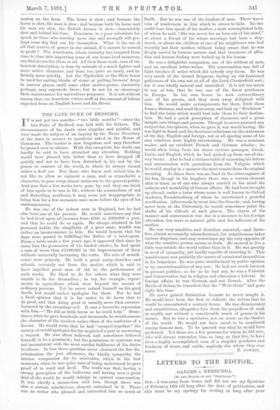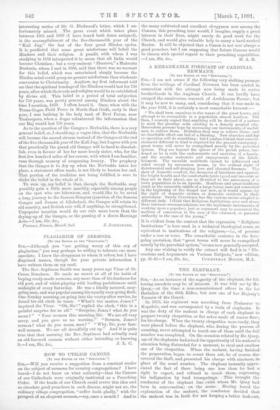LETTERS TO THE EDITOR.
GANGES v. NERBUDDA,
[To ma EDITOR OF TRH " SPROTATOR."] was away from home, and did not see my Spectator of February 14th till long after the date of publication, and this must be my apology for writing so long after your interesting notice of Sir G. Birdwood's letter, which I un- fortunately missed. The great event which takes place between 1895 and 1899 (I have heard both dates assigned), is the accomplishment of the five-thousandth year of the "Kali Jug," the last of the four great Hindoo cycles. It is predicted that some great misfortune will befall the Hindoos and their religion. A pundit with whom I was studying in 1859 interpreted it to mean that all India would become Christian ; but a very eminent " Shastree," a Mahratta Brahmin, whom I met in 1866, said that there was no warrant for this belief, which was entertained simply because the Hindoo mind could grasp no greater misfortune than wholesale conversion to Christianity. Anyhow, my first informant told me that the spiritual bondage of the Hindoos would last for 750 years, after which their rule and religion would be re-established by divine aid. This belief in a period of total subjection for 750 years, was pretty general among Hindoos about the time I mention, 1859. I often heard it. Once, when with the Trans-Gogra Field Force in North-East Oudh, early in that year, I was bathing in the holy tank of Devi Patun, near Toolseepore, when a Jogee volunteered the information that our Raj would last 750 years.
As to the question of the Ganges v. Nerbudda, there is a very general belief, or, I should say, a vague idea, that the Nerbudda will become the sacred stream instead of the Ganges at the end of the five-thousandth year of the Kali Jug; but I agree with you that practically the grand old Ganges will be hard to disestab- lish, even in favour of her far more lovely sister, who, for the first few hundred miles of her course, with which I am familiar, runs through scenery of surpassing beauty. The prophecy that the Ganges is to dry up when the Nerbudda takes her place, a statement often made, is not likely to hasten her end. That portion of the tradition not being fulfilled, is sure to shake the belief in the whole of it.
To sum up, my belief is that, though the Nerbudda may possibly gain a little more sanctity, especially among people on the spot who are lukewarm, and would like to be saved a long journey to the famous Sungum (junction of the famous Ganges and Jumna at Allaha bad), the Ganges will retain its old sanctity, and British rule will, if anything, be strengthened. Unpopular taxation would do our rule more harm than the drying-up of the Ganges, or the passing of a dozen Marriage Acts.—I am, Sir, &c,,







































 Previous page
Previous page